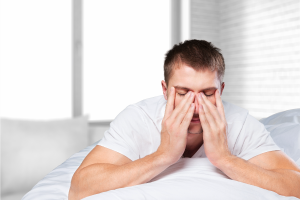Obstructive Sleep Apnea or OSA is a fairly common condition and is caused by the walls of the throat relaxing and contracting during sleep, which results in interruptions to normal breathing. This can lead to disturbed sleep patterns, a negative impact on quality of life due to regular sleep interruptions. OSA may also cause the development of other conditions.
SYMPTOMS OF OSA
If you develop OSA it’s likely that people around you will notice you snore fairly loudly and struggle to breathe. It may also be quite noticeable that you stop breathing for a short space of time during the night. You may wake up quite often throughout the night and could find yourself struggling to breathe – or even choking. The shortage of oxygen during episodes triggers your brain to pull you into a lighter sleep or to wake up. These continued sleep interruptions are likely to make you feel extremely tired during the day. Many patients are unaware that they suffer from OSA.
Characteristic breathing interruptions caused by the condition include:
- Apnea – which is where the muscles and tissues in the throat relax enough to cause a total blockage of the air passage for at least 10 seconds.
- Hypoapnea – this is a partial blockage of the air passage resulting in airflow reductions of more than 50% for at least 10 seconds.
CAUSES OF OSA
It’s quite normal for the throat to collapse to a small degree when you sleep, as the soft tissues and muscles will always relax at this time. However, this does not cause breathing problems for most people.
- OSA can be caused by a variety of reasons, including:
- Age – people over the age of 40 are more likely to develop the condition
- Sex – men develop OSA more often than women
- Weight – people who are overweight have excess body fat which increases the amount of soft tissue in the neck, placing more stress on neck muscles
- Sedatives – regularly taking sedatives such as sleeping tablets or tranquilisers can increase risks of developing the condition
- Alcohol – regular alcohol consumption, particularly just before bedtime, can worsen the condition
- Smoking – people who smoke are more likely to develop the condition.
In the main, treatment options such as lifestyle changes can reduce symptoms, however, there are treatments for OSA. These include the use of a continuous positive airways pressure device (CPAP) and oral appliances, known as mandibular advancement devices.
https://www.sleephealthfoundation.org.au/fact-sheets-a-z/191-obstructive-sleep-aponea.html
https://www.nhs.uk/conditions/obstructive-sleep-apnoea/
IF YOU THINK YOU MAY HAVE OSA
Many sufferers of OSA are not aware that they have it. There are a number of tell-tale signs that can give you an idea.
- Excessive daytime sleepiness – Because the sufferer awakens repeatedly with OSA, normal, restorative sleep is not possible. This can often lead to severe daytime drowsiness, as well as fatigue and irritability.
- Loud snoring – Snoring is not commonly thought of as a sign of something potentially serious. Your partner may be woken up and will listen in frustration. They should be looking out for long pauses in breathing (lasting many seconds). It should be stressed that not everyone who snores has OSA.
- Abrupt awakenings accompanied by gasping or choking – Because an Apnea means you have stopped breathing for a short while, your body naturally struggles. This can lead to you wakening with a shortness of breath that corrects itself reasonably quickly. Most of the time, you are still “asleep” but may make a snorting, choking or gasping sound.
- Difficulty concentrating during the day – When sleep deprived, sufferers may have difficulty concentrating. They find themselves falling asleep when the body is at rest, such as at the desk, watching TV. OSA is becoming recognised as a risk factor when when driving. Many jurisdictions require proof of therapy when renewing licences. Children and young people with OSA may not do well at school. OSA has been associated with attention or behavior problems.
If you are experiencing any or all of these symptoms, talk to your GP and ask for a referral to a Sleep Specialist. They may suggest that you undergo a sleep study where your sleeping habits can be reviewed.

